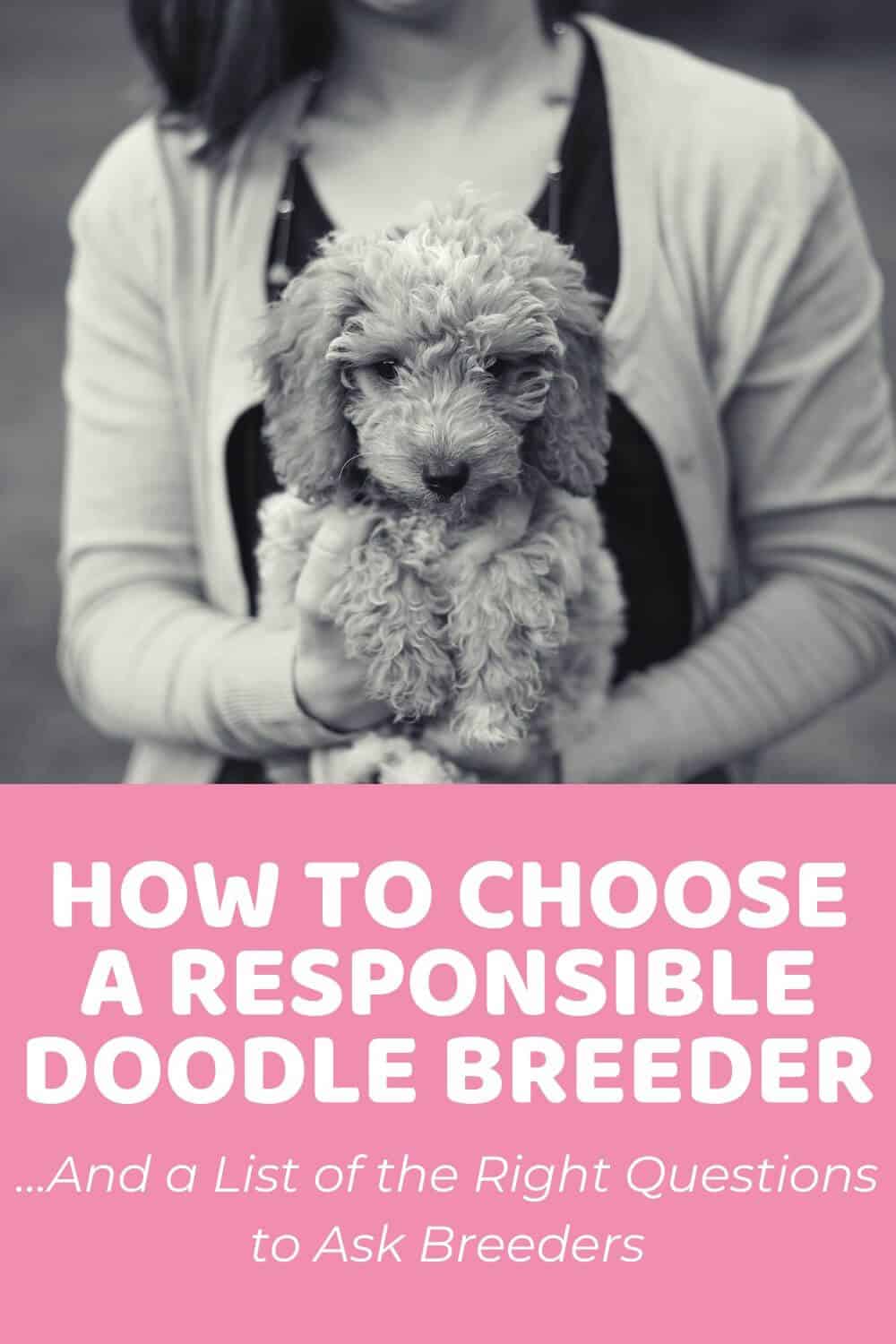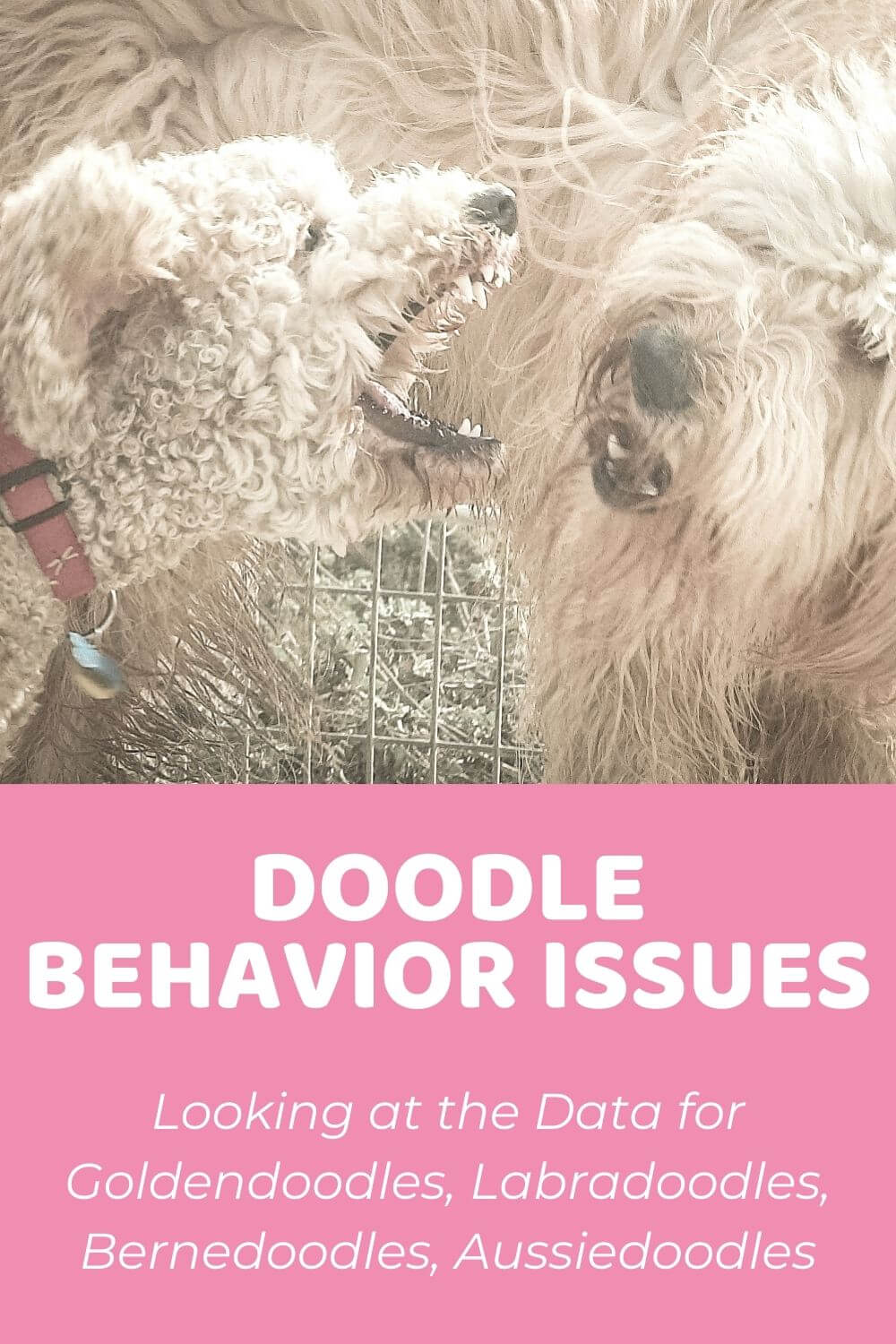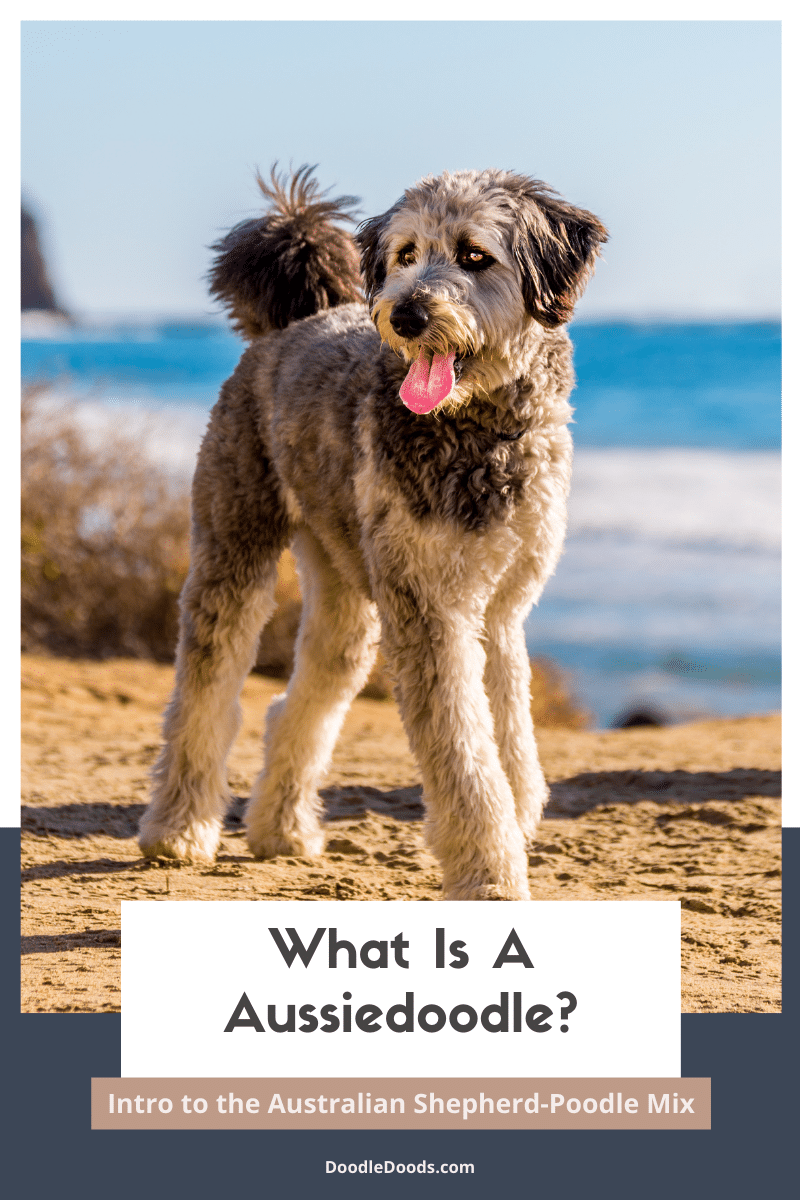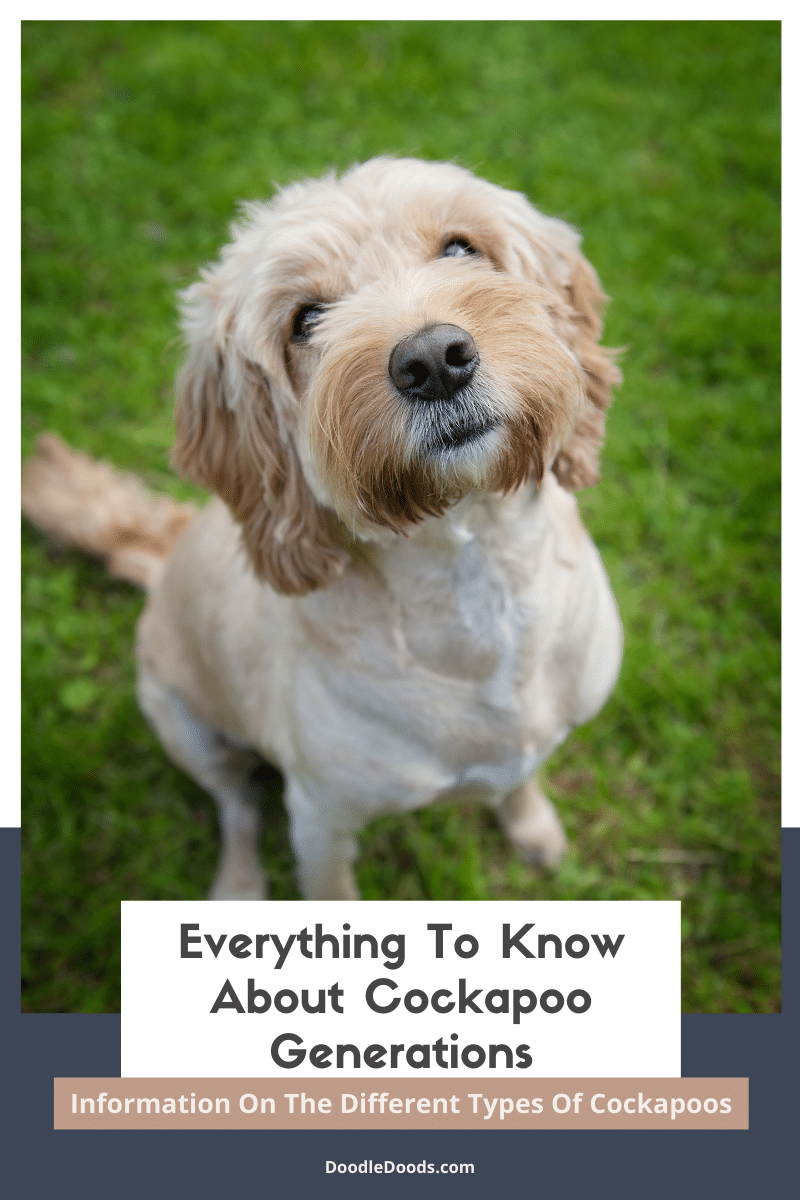Poodle mixes may not have been around for that long, but they’re extremely in-demand thanks to their many amazing qualities. But are Doodle dogs suitable for everyone? Are there any specific things to know before getting a Doodle? Indeed, committing the next 10 to 15 years to a pup is going to be a huge responsibility, and you want to make sure that you’re well-prepared for everything that comes with adopting a Doodle pup.
Table of Contents
- Things To Know Before Getting A Doodle: Intro
- What Are Doodle Dogs?
- 10 Crucial Things To Know Before Getting A Doodle
- 1. Doodles Are Expensive To Adopt!
- 2. Doodles Can Be Hypoallergenic (But Not Always)
- 3. Doodles Have A High Maintenance Coat
- 4. Know The Health Related Issues Of Doodle Dogs
- 5. Doodles Need Ample Training
- 6. Doodles Are High Energy Dogs
- 7. Doodles Come In All Shapes & Sizes
- 8. Doodles Might Develop Separation Anxiety
- 9. Owning A Doodle Can Be Expensive
- 10. Doodles Need a Proper Puppy Schedule
- Which Doodle Should You Bring Home?
- Things To Know Before Getting A Doodle: FAQs
- Final Thoughts
Things To Know Before Getting A Doodle: Intro
Doodles are all the rave in recent years, and they’re becoming more and more popular with each day. Almost everywhere you go, you encounter a Doodle pup. Whether it’s a large Goldendoodle or a small Cavapoo pup, it seems as if everyone has a Doodle!
But even though we all love these precious Doodle dogs, there’s also plenty to consider before getting one. And that’s exactly what we’re going to discuss in this guide. We’re going to dig deeper into the amazing world of Doodles, explaining exactly what they are, and talk about the most important things to know before getting a Doodle.
Preparation is key, and we want to make sure that you’re ready to embark on this wonderful adventure with your new four-legged companion!
What Are Doodle Dogs?
Doodle dogs, also known as Doodles, include various hybrid breeds that have been produced by crossing a Poodle to another purebred dog. There are lots of variations possible, almost endless.
Currently, some of the Poodle mixes are more popular and well-known than others, such as the Goldendoodle, Labradoodle, Aussiedoodle, or Cockapoo. Nonetheless, some of the rarer Doodle breeds like the Doxiepoo, Bassetoodle, or Pugapoo have also caught the attention of many dog lovers, as they combine the best traits from their purebred parents.
As the Poodle comes in three distinct sizes – Standard, Miniature, and Toy – these hybrid crosses can be achieved in various shapes and sizes. There are large Standard Doodles, smaller Mini Doodles, and the tiniest Toy Doodles. Of course, the size of the other purebred parent also plays a huge role here.
Needless to say, Poodle mixes have become so popular due to their hypoallergenic and low-shedding coats. That’s all thanks to their Poodle heritage. But what many people fail to realize is that there are also plenty of other things to know before getting a Doodle, as their allergy-friendliness is just one part of the equation.
10 Crucial Things To Know Before Getting A Doodle
So, if you’re thinking about adopting a Doodle pup, whether it’s a Bernedoodle or a Maltipoo, don’t forget to do your due diligence and carefully research the crossbreed you’re planning to adopt. Although different Doodles have different requirements when it comes to their care and overall wellbeing, there are some things that apply to each and every Doodle. Let’s take a closer look.
1. Doodles Are Expensive To Adopt!
Some people have the misconception that crossbreeds like Poodle mixes should be cheaper to adopt compared to purebred dogs. Some even go as far as complaining that Doodle breeders charge exorbitant rates for what they call “mutts”.
However, it’s important you know that reputable Doodle breeders put a lot of their own time, money, and effort into breeding new litters of Poodle mixes. One of the most expensive steps of ethical breeding is that they conduct extensive health and genetic testing of their breeding dogs to ensure that their puppies are healthy and come from strong bloodlines.
On the other hand, there are also lots and lots of Doodle scammers and puppy mills that know all too well about the booming business of Doodle breeding. Doodle scammers will simply trick you out of your money, whereas puppy mills are highly unethical breeding facilities that overbreed their breeding dogs and keep their dogs and puppies in appalling conditions, often resulting in severe health and behavioral issues.
That’s why it’s so important that you opt for a responsible Doodle breeder that’s transparent and upfront about their breeding program. In the US, ethical Doodle breeders generally charge anywhere from $1,500 and up to $5,000 for their Doodle puppies, give or take. In our humble opinion, this price tag is well worth it. And you’ll have the peace of mind knowing that your new puppy is healthy, happy, and well taken care of.
2. Doodles Can Be Hypoallergenic (But Not Always)
Even though Poodles were first crossed with other purebred dogs to achieve hypoallergenic and low-shedding companions and guide dogs, that doesn’t necessarily mean that all Doodles are hypoallergenic. In fact, there’s no such thing as a 100% hypoallergenic dog. That’s because it’s not actually the dog hair that triggers allergies in humans. It’s the protein particles found in their saliva, dander, and urine.
Of course, if a dog doesn’t shed much, those particles are much less likely to end up on your clothes, hands, floors, and furniture. Still, it’s important to remember that Doodles are a mix of two different purebred dogs, and the other purebred parent will most certainly affect the outcome.
Here’s what one of our readers has to say:
“Make sure to do the research on type of hair. Not all Doodles are the ones that are not going to shed. My biggest regret. I have hair balls EVERYWHERE.”
Sheryl SuttonSigler, Doodle Doods reader
For instance, the Goldendoodle is a cross between the double-coated Golden Retriever and the single-coated Poodle. Naturally, the outcome may lean on either side of the lineage. Most Goldendoodles get a wavy coat that’s somewhere between the curly Poodle and the straight-coated Golden Retriever. Meanwhile, others take after the Poodle parent, whereas some pups may inherit a straight coat from the Retriever. However, wavy and straight-coated Goldendoodles may still inherit the shedding undercoat. The same logic applies to all other Poodle mixes as well.
Therefore, if you’re keen on getting a Doodle with a specific coat type and potential for shedding, be sure to do your research and know exactly what you’re looking for. Our guide Top Hypoallergenic Dogs: Let’s Compare Doodles With Data will help you with that.
3. Doodles Have A High Maintenance Coat
As we’re already on the topic of Doodle coats, we cannot forget to mention the importance of their daily care and grooming. Doodles are notoriously high-maintenance dogs, and that’s one of the most important things to know before getting a Doodle.
“They will need regular brushing to avoid tangles and matting. Invest in quality brushes. Be prepared for a smart, loving and playful dog. We have a labradoodle and just can’t get over how she’s different from any other dog we have had. Very sociable and inquisitive.”
Holly Hensley, Doodle Doods reader
Thanks to their Poodle genes, all Doodles require regular haircuts and daily brushing to keep their coats healthy and beautiful. As their hair can grow pretty fast, it’s vital that you either have your Dood’s hair trimmed by a professional or do it yourself at home. In addition to that, you’ll also need to set aside time for other grooming activities. These include nail trimming, ear cleaning, bathing, and a dental hygiene routine.
But, the most important thing is what you do in between those hair trimming sessions – namely, daily brushing. Poodle mixes are prone to matting. This means that any tangles, debris, and loose dog hair that’s not brushed out will soon start to cause trouble inside the fur. Fortunately, matting can be easily prevented with daily brushing sessions. Plus, it’s an excellent way to extend the time your pup can go without bathing, as brushing will also keep their coat cleaner for longer.
Get Started Early On!
That being said, it’s important that you introduce your new Doodle puppy to regular brushing and other grooming activities early on. This will help them get used to grooming tools and the grooming process itself. Later on, it’s much harder to desensitize your dog, which will only cause that much stress for the both of you. One of our readers can attest to that:
“Start brushing your doodles coat asap. We waited too long and our labradoodle absolutely can’t stand being brushed or going to the groomer. These breeds need to be trained early on for a number of reasons.”
Danny, Doodle Doods reader
4. Know The Health Related Issues Of Doodle Dogs
One of the many great things about Doodles is that they tend to be very healthy dogs with long lifespans. That’s because hybrid breeds benefit from something called hybrid vigor. Hybrid vigor indicates that thanks to their more diverse genetic makeup, they may inherit superior qualities from their purebred parents.
Nevertheless, all Doodles are prone to certain health conditions that their purebred parents are at risk of. Some of the most common health issues in Doodles include:
- Hip and elbow dysplasia
- Patellar luxation
- Eye diseases, including progressive retinal atrophy (PRA) and cataracts
- Ear infections
- Stomach sensitivities
- Skin problems
- Allergies and food intolerances
Of course, there are other health conditions to look out for. If you’re planning on getting a Doodle puppy, be sure to research what health conditions their purebred parents are prone to. This way, you can be well-prepared in advance. All in all, having good pet insurance and taking your dog to routine vet checkups is going to help you keep your pup healthy and happy for as long as possible, while also managing the costs of any vet bills.
5. Doodles Need Ample Training
Another excellent thing about Doodles is that they’re generally very intelligent dogs that are eager to please their humans. But the issue here is that because of this, many people think that they don’t require any training. Well, this could not be further from the truth!
Just like any other breed of dog, all Poodle mixes require plenty of training from an early age for them to grow into well-behaved and well-rounded adults. You have to stay consistent and patient, and make sure you set an example to your pup. And the sooner the start, the better.
For instance, introducing your puppy to potty training, crate training, and obedience training as soon as you bring them home will not just help establish good behaviors, it’ll also help build your puppy’s confidence and prevent any fear-related behavioral issues.
In addition to that, Doodles require lots of socialization for them to learn how to properly interact with people both inside the family, but also whenever they encounter new people and other pets.
Of course, even if you’re doing everything by the book, your Doodle pup may still develop some common behavioral issues. If that’s the case or you’d just like to make sure that you have all the resources you need, we recommend you check out the Online Puppy School by Baxter & Bella.
6. Doodles Are High Energy Dogs
As Poodles are rather high-energy dogs, their Doodle offspring tend to be quite energetic and active. And if the other purebred parent is also a highly active breed, then be prepared to spend lots of time exercising and playing with your pup both outdoors and indoors.
There are also some more laid-back Poodle mixes that don’t require as much exercise like, let’s say Goldendoodles or Aussiedoodles. Still, daily exercise and playtime is necessary for any dog, as it’s one key component in keeping them healthy and preventing boredom.
In fact, as Doodles are highly intelligent and active dogs, they require both physical and mental stimulation. This is vital to prevent boredom and keep destructive behaviors at bay. So, in addition to daily exercise, make sure you also provide plenty of chew toys, puzzle games, and interactive toys for your pup to play with.
7. Doodles Come In All Shapes & Sizes
A fun thing about Doodles is that they come in all shapes and sizes. As the Poodle comes in three different sizes, there are so many different sized Doodles that breeders can produce. Of course, it’s important to also take into account the size of the other purebred parent. However, with the Poodle in the mix, we can achieve both smaller and larger Doods within the same crossbreed.
If you’re set on adopting a Doodle puppy, carefully consider what size it should be. If you live in a smaller apartment, a large Dood won’t likely feel they’re as comfortable as a smaller pup. So, before you adopt your new puppy, be sure to do your research and discuss this with your chosen breeder to ensure that you’re getting the right puppy for you.
Our Puppy Growth Chart for Doodles and Interactive Calculator has some excellent guidelines on this topic. If you’re interested in learning more about specific Doodle breeds and their size estimates, be sure to check out these guides.
8. Doodles Might Develop Separation Anxiety
Doodles are generally very affectionate and outgoing dogs, and they usually form very strong bonds with their human parents. The downside of this is that they may develop separation anxiety, which means that they may have trouble spending time alone for hours at a time.
Separation anxiety often manifests as destructive behavior, such as urinating and defecating, howling, barking, chewing and digging, and pacing. Obviously, not only are these behaviors unpleasant for you to deal with, they indicate that your pup is under a lot of stress.
Establishing good boundaries, providing a safe space for your dog, providing them plenty of enrichment, and noticing the signs of stress can all be super helpful when dealing with separation anxiety. You may also have to hire a pet sitter or a dog walker for those days when you have to leave your dog home alone. In more severe cases, however, you may have to hire a professional dog trainer to help tackle this issue.
9. Owning A Doodle Can Be Expensive
Not only is it expensive to adopt a Doodle puppy, it’s also rather costly to care for one. To be fair, a lot of money goes into caring for any dog, but one thing that’s going to cost you a significant amount of money is grooming.
“They require a lot of coat care/are very expensive because of all the grooming (every 6 weeks unless you learn to do it yourself)! And they are very active/ need a lot of exercise.”
An anonymous Doodle Doods reader
In addition to grooming costs, you’ll also have to factor in all the supplies your new pup needs, such as food and water bowls, dog beds and dog crates, toys, treats, leashes and harnesses, and their food. And if you’re really serious about becoming a pet parent, we recommend you opt for a high-quality dog food formula that’s free from any artificial fillers, preservatives, and flavors, as these are known to cause health issues.
Moreover, before you adopt a puppy, carefully consider whether or not you’re able to pay for all of their vet bills. Some of them are inevitable, such as getting your new puppy vaccinated and dewormed. However, there are also those unexpected vet visits due to accidents and illnesses. For this reason, having a good pet insurance plan is vital.
10. Doodles Need a Proper Puppy Schedule
Like other dogs, Doodle puppies thrive on a good schedule and routine that they follow every single day. You’ll want to establish a daily schedule from the day you bring your new puppy home. Not only will this help you train them, it’s also going to provide your new puppy with that much needed sense of security, helping them become confident in their new environment.
We recommend you set your puppy’s mealtimes around the same time each day, so that they know when to look forward to it. Around their mealtimes, you should also schedule their potty breaks, naps, and also playtime and time for affection with the fam.
Depending on your Doodle’s age, you can figure out how many meals they need per day. Our in-depth guide on this topic will help you with that. Next, schedule potty breaks after the meals. Keep in mind that young puppies have to go potty often, so you might have to take them outside for potty every hour or so.
In addition to that, make sure you let your pup use the bathroom before and after they wake up from a nap. If your puppy is very young, it might be reasonable to take them out for potty during their nighttime sleep as well.
Which Doodle Should You Bring Home?
If you’re set on getting a Doodle puppy, but not quite sure which one exactly, then there are a few things you should consider:
- Do you want a smaller or a larger Doodle?
- Do you want to adopt a low to non-shedding Dood, or are you okay with some shedding?
- Are you looking for a hyper and super active pup or do you want a more laid-back companion? The temperament and personality of the other purebred parent can make a huge difference here.
- Do you have young children in your family? If you do, you’ll want to opt for a Doodle that won’t get accidentally hurt by children.
- Have you ever owned and trained a dog before? If not, you may want to steer clear from more stubborn and headstrong Doodles.
We’ve created a full guide comparing Aussiedoodles, Bernedoodles, Goldendoodles, and Labradoodles in terms of their family suitability, friendliness, playfulness, and kid-friendliness, and other parameters. By the way, all of these results are updated in real-time as our readers submit their responses to the survey.
Things To Know Before Getting A Doodle: FAQs
In terms of health issues, Doodles are known to be at risk of hip and elbow dysplasia, patellar luxation, certain heart conditions, skin diseases, food allergies, eye diseases, and also ear infections. That being said, they’re also prone to developing certain behavioral issues, just like any other purebred dog. For instance, Doodles need plenty of physical and mental stimulation to prevent destructive behaviors.
We’d ask – why wouldn’t anyone want a Doodle?! Doodles benefit from their Poodle heritage, and they’re excellent pets for people who struggle with allergies, or who prefer a dog that sheds very little. In addition to that, Doodles are highly intelligent, loving, social, and overall make wonderful pets for singles, couples, and families alike. Many Doodle breeds even go on to become excellent therapy, emotional support, and service dogs.
Indeed, Doodles are prone to separation anxiety, and some Doodle breeds have a sensitive nature, which means that changes in their home life and environment may cause them to become anxious and stressed out. Fortunately, these issues can be prevented with proper training and socialization, and fixed with the help of a professional dog trainer or a dog behaviorist.
Doodles can be quite clingy dogs, especially considering how loving and affectionate they are. They also tend to form very strong bonds with their owners, which in turn makes them more prone to separation anxiety as well.
Doodles in general are very friendly, loving, and social dogs that tend to get along well with everyone. However, Goldendoodles, Bernedoodles, and Labradoodles tend to be super friendly based on our survey participant results. Above all, every dog has the potential to be friendly, as long as they’ve been properly socialized and cared for.
Final Thoughts
If you’re thinking about getting a Doodle, there are certain things to be aware of before taking the plunge. You should learn about the specific Doodle you’re thinking about adopting, understand the breed’s specific health risks, personality and temperament traits, and prepare to invest in quality nutrition and veterinary care. Have realistic expectations for training and obedience, and make sure that you have the time, money, and energy to dedicate to your pup.
Finally, remember that a Doodle is a commitment for life — so be prepared to love your new best pal unconditionally! Hopefully this article on the top 10 things to know before getting a Doodle has been a helpful resource, so you can make an informed decision that you won’t ever regret.
Learn How to Care for Your Doodle Puppy!

Perfect for first-time Doodle parents, get ALL your questions answered, including questions new Doodle parents don’t even think to ask.
Plus, get $700 worth of Bonus Materials for FREE, including:- Doodle Parenthood Community and Support Group ($190 value)
- Doodle Puppy Growth Tracker ($20 value)
- EMERGENCY Cheatsheet: When To Call The Vet Immediately ($50 value)
- HELP! Button ($145 value)
- And SO MUCH MORE!













